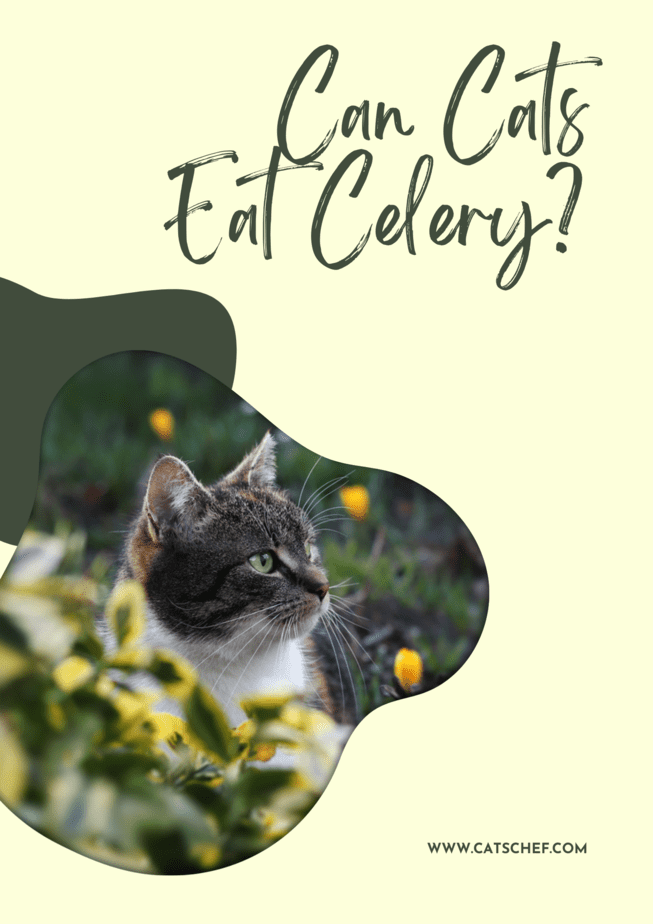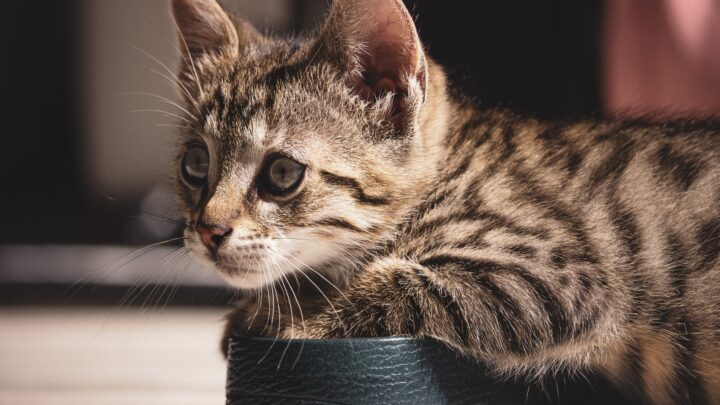Did someone mention celery? Are you one of those cat owners whose pet is obsessed with this crunchy vegetable? There are only two questions bothering you. Firstly, can cats eat celery? And then, how much celery is actually too much?
You probably dropped just a little piece of celery while preparing soup the other day and your furbaby seemed to enjoy munching on it. That’s how you discovered that she likes celery. Maybe it’s the taste, maybe it’s the crunchy texture, but she absolutely loves it!
But what about the health benefits or negative effects it can have? Do you think she consumed a bit too much while you were busy cleaning that kitchen counter and didn’t notice the exact amount? We’ll talk about that as well.
Celery is used in cooking as a spice as well as one of the main ingredients for vegetable soup. You can use both its stalk and leaves to prepare delicious meals. But what we usually forget is that celery seeds have important applications.
They have medicinal properties as an herbal remedy, salt is made out of them, and they can be used as a spice. Also, essential oils extracted from the seeds are used in the perfume industry – many people love the earthy scent.
We mostly use essential oils for massages and this one is no exception. Celery oil helps to relieve pain and is mostly used to treat rheumatism, arthritis, and gout. It also eases muscular pain after vigorous workouts.
You were probably aware of all the health benefits of this magical plant for human beings, but what about our furry friends? Can cats eat celery? Time to find out!
Can cats eat celery?
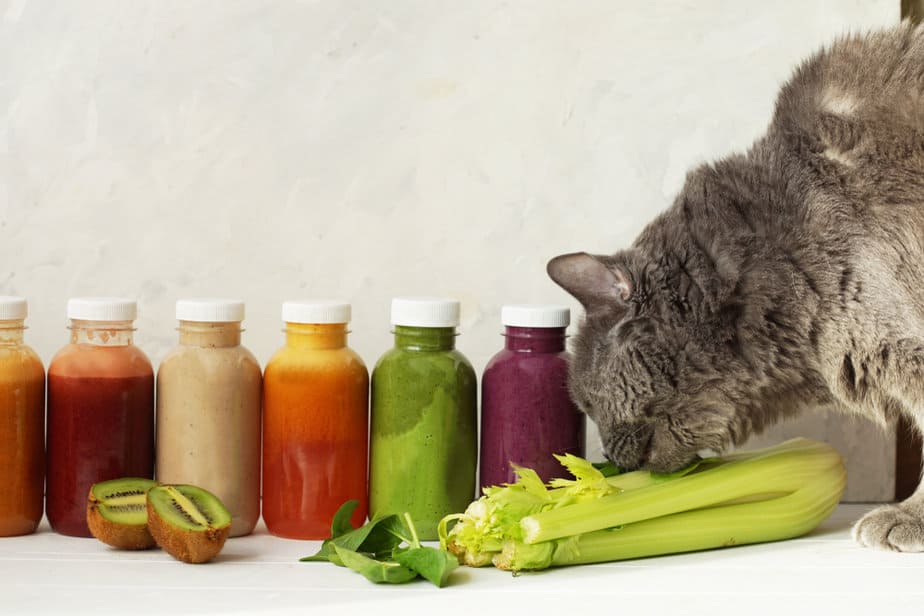
The shortest answer I can give you is yes, cats can eat celery. But before you decide on your own to change your cat’s diet, make sure you double-check with your vet how to go about it.
Since your feline friend is an obligate carnivore, her diet must include a lot of meat. Whichever human food that you want to introduce to her diet plan, introduce it solely as a snack, never as a full meal. You can also serve it as a side dish to her wet food, or mix it together.
Some veggies are good for your feline in moderate amounts, but you still have to be careful when sharing them with your furbaby. Carrots, peas, zucchini, lettuce, spinach, and pumpkin are just some of the cat-friendly veggie options. Your kitto will enjoy their taste and they provide nutritive value.
Celery fits in this group too. It’s a great snack for humans and also for our little furry fellas. So next time you take that celery stalk, give a little piece to your cat. And enjoy the view while she tries to grab a hold of it with her cute paws and go to town on it.
This vegetable is not toxic to cats, although overconsumption can lead to some light digestive issues such as diarrhea, vomiting, and upset stomach. That is if your cat is not allergic, of course. Otherwise, it goes without saying to avoid celery completely.
I know there’s probably no need for me to mention this, but before serving it up to your furchild, wash it carefully in plain water. This will rinse any residual chemicals if the celery was treated with some beforehand. Afterward, cut it into small, bite-sized parts before serving this delicacy to your cat.
What are the benefits of celery?
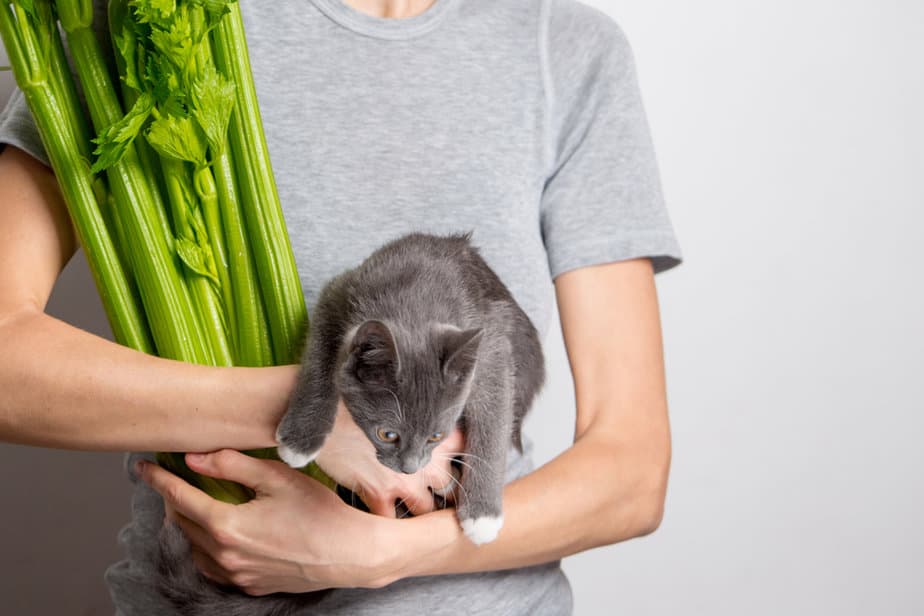
Now that we concluded that you can serve celery to your feline and how to prepare it properly, the time has come to learn all the benefits of this crunchy snack.
Celery is high in fiber, which is really good if your cat has some digestive issues. It also contains antioxidants called apigenin and luteolin, helping to soothe inflammation and reduce the risk of cancer.
This magical veggie is approximately 95% water, making it a great snack option to keep your cat hydrated. As mentioned before, however, too much celery and your cat may end up with diarrhea, which could lead to mild dehydration – the opposite of what you’re aiming for.
Moreover, celery is a natural diuretic, helps clean the body of toxins, and aids in regulating blood pressure and lowering triglyceride levels and cholesterol. It also helps the regeneration of neurons and eases constipation.
Its interesting texture is pleasurable for cats to chew on and they will inevitably enjoy that crunch! Even though it’s not being promoted as something cats should eat, celery has a lot of benefits and you can easily incorporate it into your feline’s meals every other day.
This means you shouldn’t serve this to your cat constantly, but rather in moderation. Do not hesitate to include it in your cat’s diet every once in a while because it can help to boost their immune system and keep their fur and skin healthy.
Similar to bean sprouts, zucchini, broccoli, spinach, and carrots, celery is rich in vitamins A, K, and C and minerals such as magnesium, sodium, potassium, folate, and iron. They all regulate body functions like muscle contraction and blood flow.
Be mindful about the portions you’re serving to your feline because even if the food type is good and healthy, too much of anything can hurt her and result in health issues.
Chances are that you won’t be able to find celery as the main ingredient of cat food in stores, but there are a lot of recipes online that someone out there has experimented with. Just a reminder: Always consult with your vet before deciding to serve your cat human food.
Can cats drink celery juice?
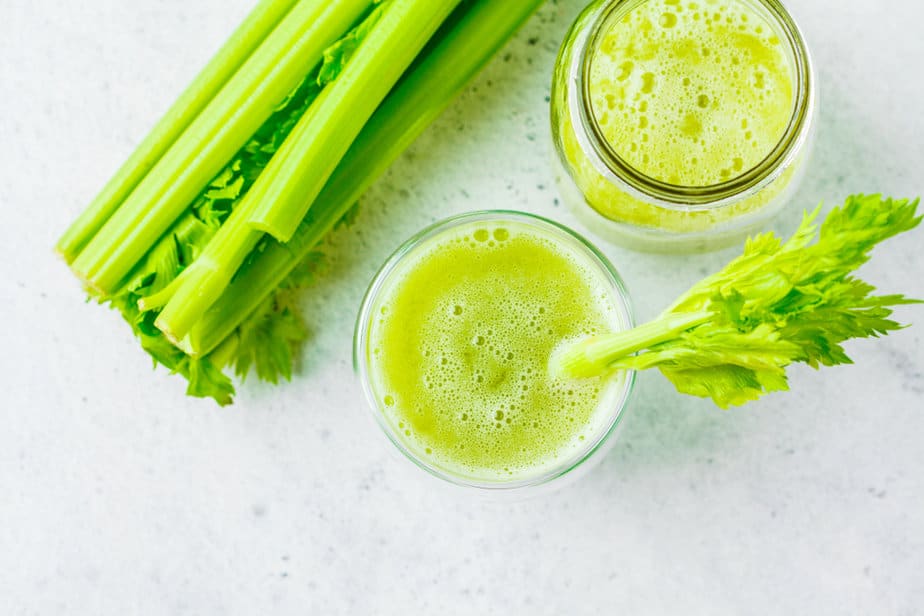
The only part of this plant that you cannot feed to your cat is its root. So, if you mix some stalk and leaves all up and blend it to make refreshing juice, your adorable feline can have some.
It’s safe to serve your cat some celery juice, but make sure it’s not in large amounts. Cats are not used to drinking too much liquid and if they consume a bit more than they should, they may face some problems.
We’ve stated previously that one of the benefits this veggie brings to the table is hydration. Just pay attention to not give your cat more than she can handle (usually one to two tablespoons of juice daily).
Giving your feline some celery juice will prevent any possibility of choking.
Can cats eat celery leaves?
Some cats enjoy munching on celery leaves. You may catch them just rubbing their faces onto them. Yes, you read that right. Are you wondering why’s that the case?
Well, besides being nutrient-rich, celery leaves have a similar effect on cats as catnip. However, they do contain a small dose of toxic compound, but if your cat doesn’t eat a lot of it, she’ll be just fine.
If you notice that something’s off, like she’s got diarrhea and you suspect that she could’ve consumed a lot of celery, do not hesitate to obtain immediate medical assistance.
What about cooked celery?
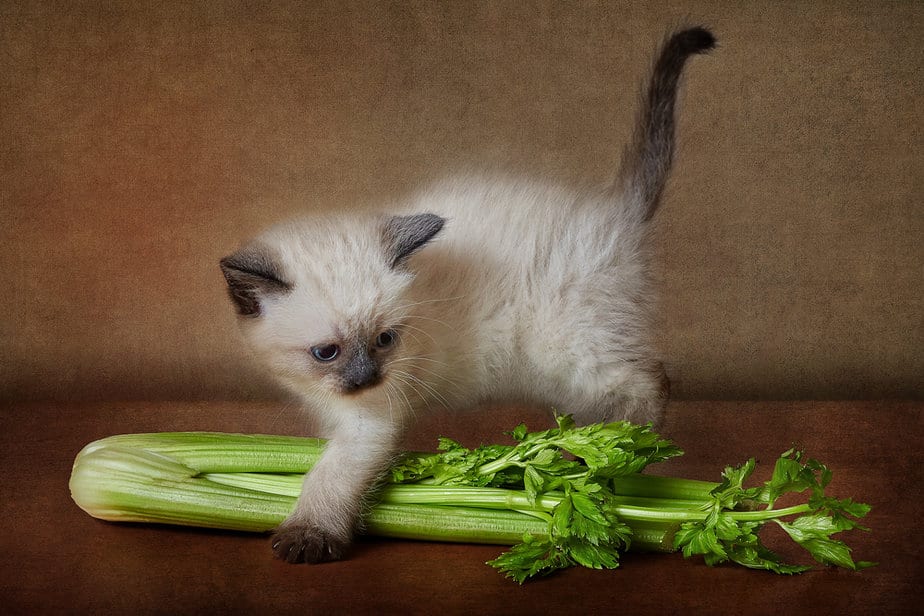
Cooked celery is not something your kitty is likely to turn down. She’ll enjoy its taste and texture too! If she has some problems with chewing, cooking celery may help her get the best out of it.
Most vegetables lose some nutritive value when cooked and it’s not like you have to cook celery before serving. It’s not obligatory like for cauliflower, for example. Celery is best served raw and fresh, but it won’t be troublesome if you serve it warm and cooked either.
Just remember, if you want to cook it, don’t use any spice but rather serve it plain. Spicy food can have a negative effect on your feline’s digestive system and you truly want to avoid that.
Bonus tip
Since cats generally enjoy eating celery, you can make it a fun experience. Find a spot in your home where you can hang it by its stalk and let the leaves move freely.
You already know that celery leaves have a similar effect on cats to that of catnip, and she enjoys chewing on that stalk. What is her favorite activity? Hunting, right? And, you’ve probably used a feathery toy to entertain her from time to time.
It’s a win-win situation! You won’t have to worry about how much celery she consumed – you know exactly how much is hanging over there. And I guarantee you, she’ll enjoy playing with it and, of course, munching on it!
However, before you decide to introduce new ingredients and human food into your cat’s diet, always consult with your vet first.
And if she ate something before you had a chance to ask for advice, don’t panic. Monitor her and in case she shows any kind of abnormal behavior, do not hesitate to seek medical assistance.
